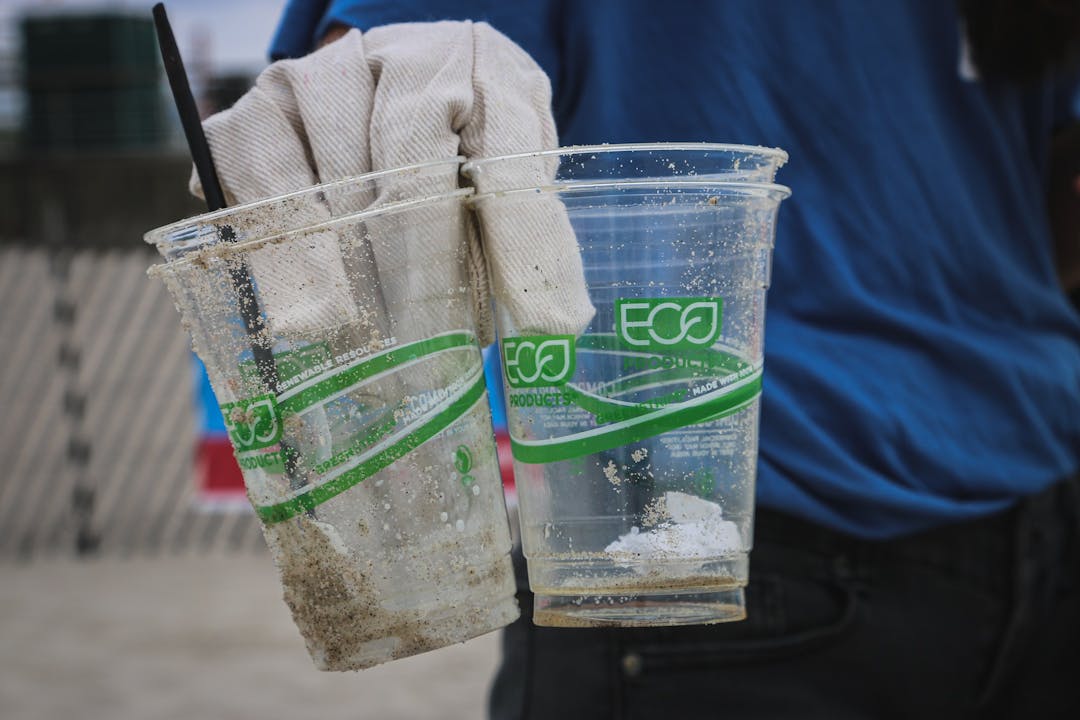Single-Use Plastics

Cupertino's Single-Use Plastics Ordinance was approved by City Council on September 6, 2022. View the ordinance here or watch the council meeting here.
The City of Cupertino City Council approved the ordinance in order to reduce the unnecessary use of single-use disposable plastic food service ware (such as cups, utensils, and containers) by restaurants and other food facilities.
Why is it important?
Plastic is causing a lot of concern because:
- Plastics and microplastics are now found in the ocean, air, soil, and animals (including humans).
- Food packaging is often littered, and plastic litter does not biodegrade, it justContinue reading
Cupertino's Single-Use Plastics Ordinance was approved by City Council on September 6, 2022. View the ordinance here or watch the council meeting here.
The City of Cupertino City Council approved the ordinance in order to reduce the unnecessary use of single-use disposable plastic food service ware (such as cups, utensils, and containers) by restaurants and other food facilities.
Why is it important?
Plastic is causing a lot of concern because:
- Plastics and microplastics are now found in the ocean, air, soil, and animals (including humans).
- Food packaging is often littered, and plastic litter does not biodegrade, it just breaks into smaller and smaller pieces.
- Plastics can leach harmful chemicals into food and beverages.
- Plastics can be difficult to recycle. When they are recycled it is often into new products such as fleece or composite wood replacements that cannot themselves be recycled (downcycling).
- Plastic foodware is often used for just a few minutes and then goes to landfill.
- Plastics production can be bad for air and water near factories which can have an effect on human health.
Many plastic products are important and even life-saving, but humans can reduce or eliminate many single-use plastics without impacting their quality of life.
What can a Single-Use Plastics Foodware Ordinance do?
An ordinance could phase in a variety of requirements for food businesses to reduce the use of single-use plastic and encourage more reusable foodware, such as:
- Require that prepared takeout food be served using compostable fiber-based cups, containers, utensils, and other accessories
- Require reusable foodware for dining in.
- Ban local use and sale of compostable plastic cups and containers.
More information on the proposed ordinance can be found below. City Council will be considering these ideas at a special study session on March 1, 2022 and the public is welcome to attend and share thoughts during public comment opportunities.
How can you get involved ?
Participation for developing the ordinance has now closed. Please help us implement these waste reduction practices by reporting businesses that are not complying with the new regulations.
-
Understand the Ordinance
Share Understand the Ordinance on Facebook Share Understand the Ordinance on Twitter Share Understand the Ordinance on Linkedin Email Understand the Ordinance link

-
The Truth about Bio-Plastics
Share The Truth about Bio-Plastics on Facebook Share The Truth about Bio-Plastics on Twitter Share The Truth about Bio-Plastics on Linkedin Email The Truth about Bio-Plastics link While some plastic foodware containers are currently accepted as recyclable in Cupertino, recycling does not address all problems with plastics. This includes problems with foodware containers and utensils made from polylactic acid (PLA) or other “compostable plastics,” which are not accepted in Cupertino’s organics recycling program because they take too long to degrade. An exception is made for Biodegradable Products Institute (BPI)-certified compostable plastic bags, which are allowed to collect food scraps. Bio-plastic materials behave the same as traditional plastic in the environment in terms of photodegrading into smaller pieces and being eaten by wildlife, and do not break down any more readily in the water. Bio-plastic cups and containers are confusing to users because they appear identical to traditional plastic items and are often mistakenly sorted as recyclable. Bio-plastic foodware also tends to be the most expensive type of single-use foodware and creates a false sense of environmental benefit. Even if labeled as BPI-certified compostable, bio-plastic cups, containers, utensils, and accessories are still considered contaminants in the composting process. If bio-plastics are disposed in landfill they create methane as they degrade. If disposed as recyclable or compostable they must be sorted out as contaminants and are sent to landfill. There is no place for the currently-available bio-plastics in Cupertino’s waste streams.
While some plastic foodware containers are currently accepted as recyclable in Cupertino, recycling does not address all problems with plastics. This includes problems with foodware containers and utensils made from polylactic acid (PLA) or other “compostable plastics,” which are not accepted in Cupertino’s organics recycling program because they take too long to degrade. An exception is made for Biodegradable Products Institute (BPI)-certified compostable plastic bags, which are allowed to collect food scraps. Bio-plastic materials behave the same as traditional plastic in the environment in terms of photodegrading into smaller pieces and being eaten by wildlife, and do not break down any more readily in the water. Bio-plastic cups and containers are confusing to users because they appear identical to traditional plastic items and are often mistakenly sorted as recyclable. Bio-plastic foodware also tends to be the most expensive type of single-use foodware and creates a false sense of environmental benefit. Even if labeled as BPI-certified compostable, bio-plastic cups, containers, utensils, and accessories are still considered contaminants in the composting process. If bio-plastics are disposed in landfill they create methane as they degrade. If disposed as recyclable or compostable they must be sorted out as contaminants and are sent to landfill. There is no place for the currently-available bio-plastics in Cupertino’s waste streams. -
City Council Study Session Update
Share City Council Study Session Update on Facebook Share City Council Study Session Update on Twitter Share City Council Study Session Update on Linkedin Email City Council Study Session Update linkKey elements of the proposed single-use plastics ordinance were brought to a City Council Study Session on March 1st. City Council directed staff to return with a draft ordinance for a first reading in April. If you were interested in attending the meeting, but unable to make it you can view the recording, presentation slides, and staff report here.
-
See what is being proposed in the draft ordinance
Share See what is being proposed in the draft ordinance on Facebook Share See what is being proposed in the draft ordinance on Twitter Share See what is being proposed in the draft ordinance on Linkedin Email See what is being proposed in the draft ordinance linkThe first phase of the draft ordinance mirrors the requirements of state law (AB 1276) and requires that food service ware accessories such as utensils, chopsticks, condiment cups and packets, straws, stirrers, splash sticks, and cocktail sticks be provided only upon request by customers. These requirements become effective on June 1, 2022.
The second phase of the draft ordinance includes elements that would go into effect one year later, on August 1, 2023. These requirements include:
1. Prohibiting the use of non-complaint food service ware by food providers:- Continue to prohibit use of expanded polystyrene foam food service ware
- Prohibit use of single-use plastic items (even if accepted as recyclable)
- Prohibit use of bio-plastics (compostable plastics)
- Require takeout food service ware to be fiber-based and compostable or entirely made of aluminum
2. Reusable food service ware required for dining on premises:- Reusable food service ware must be provided for customers dining on site at the food provider’s location. Requires sufficient dishwashing capacity or a contract with a dishwashing service.
3. Prohibiting the sale of non-compliant foodware:- Ban local sale of expanded polystyrene foam, and bio-plastic food service ware
Attend the City Council Study Session on August 16, 2022 to hear more about the draft ordinance and have an opportunity to speak about the proposal.
Thank you for your contribution!
Help us reach out to more people in the community
Share this with family and friends
No thanks -
Results from Customer and Restaurant Study Available
Share Results from Customer and Restaurant Study Available on Facebook Share Results from Customer and Restaurant Study Available on Twitter Share Results from Customer and Restaurant Study Available on Linkedin Email Results from Customer and Restaurant Study Available linkIn 2021,Cupertino's Environmental Program division partnered with a consultant to discover what Cupertino's restaurants and customers thought about single-use foodware items.
Most customers that were surveyed are very concerned about the environmental impacts of these items. They would support businesses that implemented environmentally preferable alternatives and are generally in favor of a foodware ordinance.
Food facilities survey results indicated that the cost is similar to what they are paying now and if there is technical assistance available to help offset increased costs, these managers would also widely support a foodware ordinance.
Read more detail and view the entire survey results: https://engagecupertino.org/12429/widgets/40425/documents/26257
-
Cupertino Plastics Data
Share Cupertino Plastics Data on Facebook Share Cupertino Plastics Data on Twitter Share Cupertino Plastics Data on Linkedin Email Cupertino Plastics Data linkPlastic Myths vs Facts
 Click the image to open the full document and take a deeper look into Cupertino Plastics Data
Click the image to open the full document and take a deeper look into Cupertino Plastics DataDive into the data to gain a better understanding of the plastic waste that is generated in Cupertino. Page two of this infographic shows how that plastic waste is sorted into the trash, recycling, and organics bin for collection.
What does this data tell us?
- Half of the plastic waste in Cupertino is NOT recyclable.
- Of the 50% of plastics that could be recycled, only 17% were successfully cleaned and put in the blue cart.
- About a quarter of plastics are incorrectly “wishcycled” into the blue or green carts.
- Room for improvement: an estimated 1288 tons of plastic could be recycled if clean and sorted correctly.
What can you do to help?
- Learn what goes in each bin at Cupertino.org/NoWaste
- Make sure your plastic is empty, clean, and dry before putting it in the recycling bin.
- Invest in a reusable alternative to reduce your waste.
- Give your feedback and stay up to date with the Single-use Plastics reduction efforts in Cupertino.
All data extrapolated from sample study in 2018 and 2019.
Key Dates
-
August 16 2022
-
September 06 2022
Follow Project
Related Links
Quick Polls
Lifecycle
-
Step 1- Conduct Outreach and Seek Feedback
Single-Use Plastics has finished this stageEducate, gather ideas, priorities, and concerns from community.
- Surveys
- Council and Commission meetings
- In-person outreach
-
Step 2 - Bring Proposed Ordinance to City Council
Single-Use Plastics is currently at this stageIf Council members approve, the ordinance will be scheduled for a second reading and adoption.
-
Step 3 – Educate Community About Ordinance
this is an upcoming stage for Single-Use Plastics14 months between adoption and enforcement allows for businesses to be informed and receive guidance if needed.
-
Step 4 – Enforcement Begins
this is an upcoming stage for Single-Use PlasticsAfter the educational period, compliance will be required under the municipal code.
Videos
Who's Listening
-

Phone (408) 777-7603 Email UrsulaS@cupertino.org -

Phone (408) 777-3243 Email NicoleL@cupertino.org




